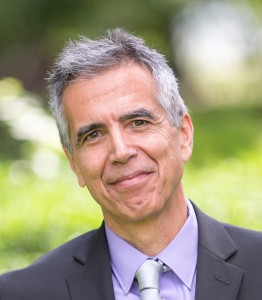John G. Georgiadis has been appointed chair and Pritzker Endowed Chair Professor in the Department of Biomedical Engineering effective January 16, 2015.
Georgiadis comes to IIT Armour College of Engineering from the University of Illinois at Urbana–Champaign, where he is the Richard W. Kritzer Professor with a joint appointment in the Department of Bioengineering and the Department of Mechanical Science and Engineering. Georgiadis earned his Engineering Diploma (five-year undergraduate degree) from the National Technical University of Athens, Greece. He then attended the University of California at Los Angeles, where he received his M.S. and Ph.D. in mechanical engineering. He taught at Duke University as an assistant professor and then associate professor in the Department of Mechanical Engineering and Materials Science, before joining the University of Illinois in 1992. He has also been an associate researcher at the Institut de Mecanique des Fluides de Toulouse, France, a visiting professor at the Cyprus Institute in Nicosia, Cyprus, and a faculty affiliate at the Beckman Institute in Illinois.
His research pursuits are motivated by the need to protect and improve the health of the human brain and muscle, and to develop better water-purification methods. With his Duke colleagues, Georgiadis studied thermal-transport phenomena in complex fluid-saturated media (Nature 1993). Through a National Science Foundation award, he co-founded the Center for Advanced Materials for the Purification of Water with Systems at the University of Illinois (Nature 2008). This center has made a strong impact on the careers of faculty and students of more than a dozen universities who represent a wide range of disciplines such as biology, chemistry, ecology, engineering, geology, hydrology, physics, and public-policy analysis, and share a deep commitment to solving important societal problems.
Georgiadis’s activities in biomedical engineering have been driven by open questions related to brain and muscle changes with age, and involve the use of non-invasive techniques like magnetic resonance imaging to probe the human central nervous system and skeletal muscle. In collaboration with Dartmouth College, the Illinois group achieved the highest resolution mapping of the viscoelastic properties of the human brain in vivo by using magnetic resonance elastography (NeuroImage 2013). Georgiadis’s efforts are currently centered on the study of metabolic or age-related disorders associated with modern-living conditions. Research and education form a continuum, especially in biomedical engineering. Georgiadis has developed and taught courses in biomechanics and bioenergetics, and supervised the graduate work of many classically trained engineering students who have transitioned to careers in biomedical engineering or medicine.
Georgiadis has received financial support for his research group from various sources, such as the National Science Foundation, the National Institutes of Health, the Defense Advanced Research Projects Agency, and the European Union. He has authored more than 70 archival publications and filed three patents with his research collaborators. He has provided editorial services for publications like the Journal of Fluids Engineering, Journal of Heat Transfer, Journal of Porous Media, and Membranes. In addition, he has presented numerous invited/keynote seminars and conference papers, and has received several academic and professional honors and recognitions, including the National Science Foundation Presidential Young Investigator Award (1991–96).

